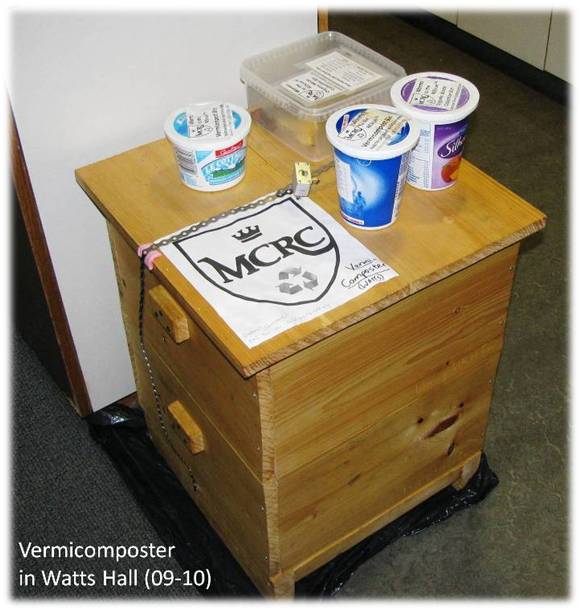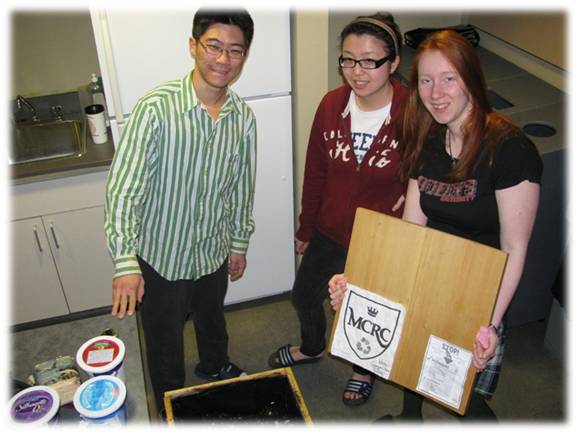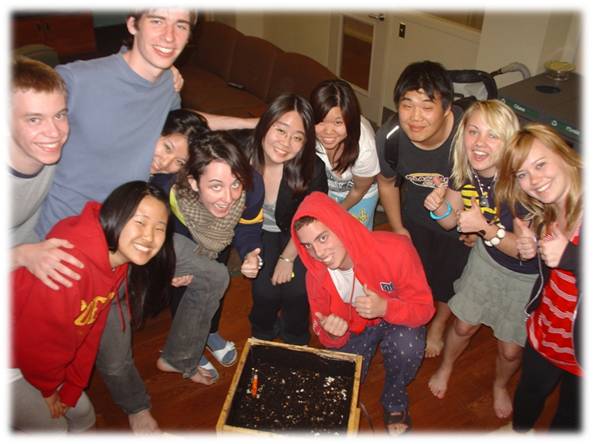 Residence Vermicomposting Project
Residence Vermicomposting Project
In the Fall term of the 2009-2010 academic year, I developed and intiated the first systematic university residence vermicomposting program in Canada at Queen's University. I was serving as Sustainability Coordinator of the Main Campus Residents' Council (MCRC) at the time, and, working with the Residence Administration and a local student-run business, we leased 11 hand-made vermicomposters for all but one residence building on campus.
The program was entirely student run, and required absolutely no extra work on the part of Queen’s custodial staff. Throughout the year, the residents of the 11 floors containing a composter, led by their Residence Dons, looked after the day-to-day maintenance of the composters, collection of organic waste, and feeding of the worms. . Dons were provided with organic waste collection bins (re-used empty yogurt pots) in order for students to put their waste in before transferring to the composter. Students were encouraged to develop a sense of ownership and pride for their floor vermicomposter.
 I organized a group of student volunteers, known as the Composting Crew (part of the larger MCRC Green Team I led), which coordinated the installation of the composters and provided regular maintenance, support, and educational programming for Residence Dons and residents of the floor. This team was led by the ever-capable Trevor Shah, Zhimeng Jia, and Laura Hendren.
I organized a group of student volunteers, known as the Composting Crew (part of the larger MCRC Green Team I led), which coordinated the installation of the composters and provided regular maintenance, support, and educational programming for Residence Dons and residents of the floor. This team was led by the ever-capable Trevor Shah, Zhimeng Jia, and Laura Hendren.
Overall, from the point of view of residents, Dons, custodial staff, and the Queen’s public, the program has been successful. We tracked vermicomposter intake, and showed that each vermicomposter was able to consistently process 2-4kg of waste per week. Moreover, the tremendous excitement and interest generated by this project in and outside of Queen’s, along with the positive feedbacks the Composting Crew has gathered from the participating floors across Residences, illustrates this success.
Here are some of the feedback we recieved from Residence Dons:
- Supriya S. (Don, Gordon-Brockington): “the program is great, I’m really glad that my floor got a chance to participate in the program. The worms were a part of our floor…I wish every floor could have one [a vermicomposter].”
 Ian B. (Don, Watts): “The vermicomposter has been a great addition to the floor this year. It offers residents an easy and productive option to deal with leftover food. It turns food waste into plant food, helping us take one small step in the right direction. I have enjoyed having it on my floor and hope that I will be able to have a vermicomposter on my floor next year!”
Ian B. (Don, Watts): “The vermicomposter has been a great addition to the floor this year. It offers residents an easy and productive option to deal with leftover food. It turns food waste into plant food, helping us take one small step in the right direction. I have enjoyed having it on my floor and hope that I will be able to have a vermicomposter on my floor next year!” - Hannah S. (Don, Victoria Hall): “I think putting vermicomposters in residence is an amazing way to actively engage with first year residents on issues of sustainability within their own living space. Although my residents may not have been as involved in the actual project, it was a first experience for many which has them spreading the word about the worms to other people living in the building, or showcasing them to new visitors on our floor.”
- Jon R. (Don, Waldron): “It stimulated good conversations…and made the students involved look at the environment in a different way.”
- Snaige J. (Don, Victoria Hall): “I feel like it is a good program to redirect waste and to create a new and different learning environment. It should keep going.”
- Emma P. (Don, Leggett): “The program was good for student awareness…no one was creeped out when they figured out what the vermicomposter was.”
- Aimee B. (Don, Leonard): “The vermicomposting program in Queen's University Residences has had astounding support from residents on my floor. It is amazing the amount of waste diverted from the garbage cans; the little yogurt cups were constantly filled and our worms ate well all year. I would strongly recommend continuing with this program as it created food waste awareness to first year students and it is evident through the enthusiasm for the program that this knowledge will carry on into their upper years at Queens, and into their future after Queens.”
- Heidi M. (Don, McNeil): “I really appreciated the opportunity, and the students did too!”
Here are some of the publicity we recieved in the Queen's press:
- Queen's Journal: Residences venture into vermicomposting
- Queen's Gazette: Vermicomposting program a hit in Queen's Residences
The program in 2009-2010 was a trial, designed to gather numerical data and verbal feedback from students with composters on their floors, to see if the program will be successful in the future. At the end of the year, it was clear to all that the continuation of the project will be beneficial to Queen's and its Residences, serving both as a method to promote urban sustainability by diverting our organic waste, as well as a way to educate students regarding the benefits of composting. Through learning about the vermicomposter and working hands-on with such an innovative product, first year students saw the necessity and practicality of composting in general, and will likely continue to compost their wastes even after leaving Residences.
To ensure the vermicomposting program continued in later years, I did two things:
- Wrote the MCRC bylaw amendments requiring future MCRC Sustainability Coordinators to take the leadership role in maintaining the residence vermicomposting program (Part of the full set of bylaws I wrote to make permanent the Sustainability Coordinator position within the MCRC)
- Wrote, compiled, and edited a 26-page summary report for the Residence Administration containing full details of the benefits of the vermicomposting program for residences, the history of the program so far at Queen's, tracking of compost stats, anecdotal feedback, photographs of each vermicomposter being used by students, media coverage we've received, as well as recommendations for the future.
At the end of the 2009-2010 school year, I met with the residence administration with a chorus of student support, and recommended the expansion of the vermicomposting program in future years to cover more floors in residence (and ultimately even all floors). Doing so would provide more residents with this profound, hands-on learning opportunity, and divert more organic waste from landfills. Because of the hard work of everyone involved in the program to date, the residences are now home to over 30 vermicomposters - covering almost a third of all floors in all the residences. Worms have become the official pet of Queen's Residences!